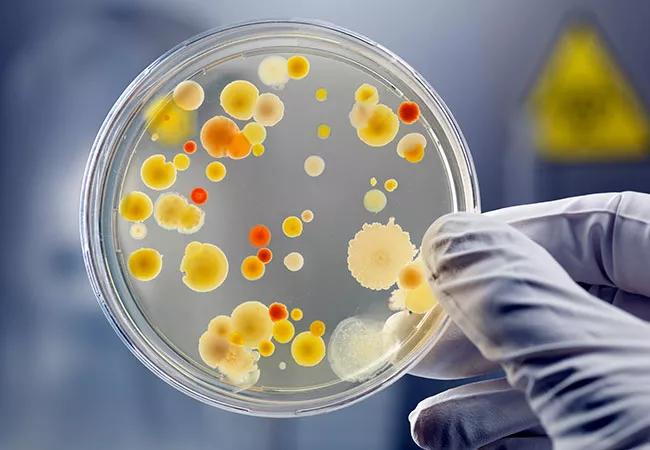Targeting the microbe-host adhesion process

Image content: This image is available to view online.
View image online (https://assets.clevelandclinic.org/transform/850964b2-e86b-496a-bef4-33efddc622b2/650x450-microbial-adherence_jpg)
Microbes growing in petri dish
Jeannette Messer, DVM, PhD, Department of Inflammation & Immunity, has received a Catalyst Research Award from the Dr. Ralph and Marian Falk Medical Research Trust to develop small molecules that can help treat or prevent a wide range of microbial-related infectious diseases, which are responsible for millions of deaths worldwide each year.
Advertisement
Cleveland Clinic is a non-profit academic medical center. Advertising on our site helps support our mission. We do not endorse non-Cleveland Clinic products or services. Policy
Despite different origins, infectious diseases caused by bacteria, viruses, fungi and single-cell parasites all follow the same infection pattern, which starts with microbe-host adhesion. Like a lock and key fitting together, proteins found on the surface of microbes selectively bind to carbohydrates on the surface of host cells. Dr. Messer believes that targeting the universal microbe-host adhesion process may be the key to preventing microbial-related infectious diseases.
With this award, Dr. Messer will work together with researchers from the Cleveland Clinic Center for Therapeutics Discovery to design small molecules that outcompete host cells for binding and prevent the earliest stages of infection.
Targeting a molecular feature that is common across a multitude of bacteria, viruses, fungi and single-cell parasites — rather than trying to prevent infection on a microbe by microbe basis — represents a paradigm shift in how researchers and clinicians approach infectious disease.
“We are really excited by this new line of investigation and are hopeful that our efforts will yield promising molecular leads for a completely new class of antimicrobial drugs — one that focuses more on microbial behavior and less on specific microorganisms,” said Dr. Messer.
“I am grateful to the Dr. Ralph and Marian Falk Medical Research Trust for their support of this project, which was made possible by the expertise and collaboration of my colleagues in the Cleveland Clinic Center for Microbiome and Human Health and the Cleveland Clinic Center for Therapeutics Discovery.”
Advertisement
The Catalyst Research Award provides $300,000 in funding and eligibility for the Falk Transformational Award, which would provide an additional $1 million over two years. The Transformational Awards Program is only open to successful Catalyst awardees and is designed to help bridge the technology transfer gap and propel small molecules further along the drug discovery pipeline towards commercial development and clinical use.
Advertisement
Advertisement
First full characterization of kidney microbiome unlocks potential to prevent kidney stones
Researchers identify potential path to retaining chemo sensitivity
Large-scale joint study links elevated TMAO blood levels and chronic kidney disease risk over time
Investigators are developing a deep learning model to predict health outcomes in ICUs.
Preclinical work promises large-scale data with minimal bias to inform development of clinical tests
Cleveland Clinic researchers pursue answers on basic science and clinical fronts
Study suggests sex-specific pathways show potential for sex-specific therapeutic approaches
Cleveland Clinic launches Quantum Innovation Catalyzer Program to help start-up companies access advanced research technology